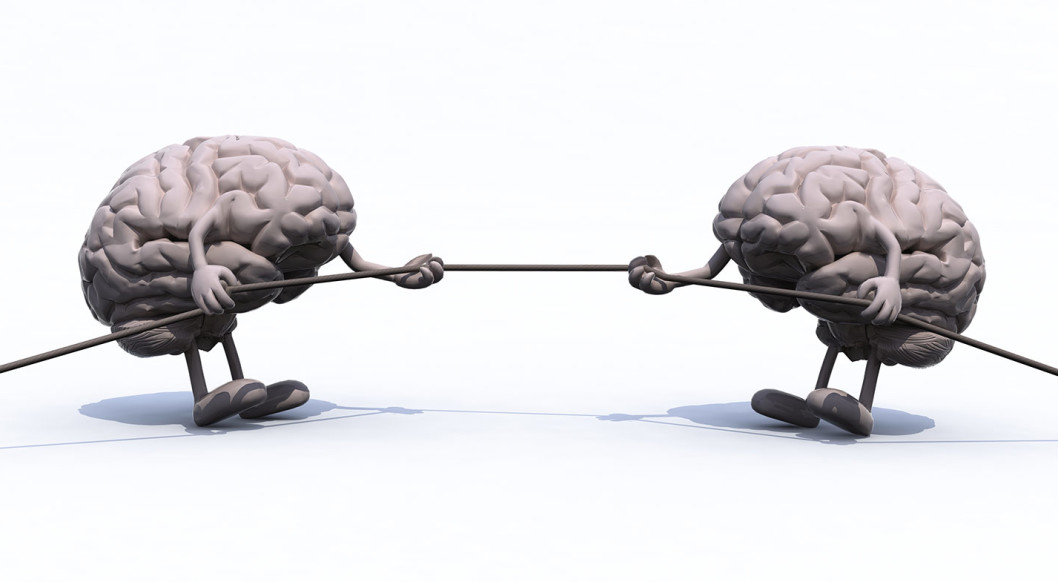
Are People With Social Anxiety “Weak Minded?”
One of my favourite quotes is from Albert Camus, a French philosopher:
“Nobody realizes that some people expend tremendous energy merely to be normal.”
It neatly sums up the frustration with social anxiety: you have a very real, very serious anxiety that greatly affects your life…but your efforts to hide it make people think there’s nothing wrong.
In short, most people don’t understand what you go through on a daily basis. So they assume your toned down, moderated version of yourself is the “real” you (can’t blame them for that).
But what does social anxiety feel like?
It feels like your brain is having a tug of war – with itself. You don’t have control over this debate. Your conscious mind is just a spectator.
This is something you’ve probably come to accept as normal…
But who is debating with who, exactly? Why does part of your brain make you dread a social event, while another is telling you it’s important to attend? What decides which part of your brain “wins?”
Until recently, these questions were the realm of philosophy.
But recent advances in neuroscience are starting to hint at answers
In the book “Incognito: The Secret Lives of the Brain,” neuroscientist David Eagleman argues that the brain is actually made up of numerous sub-systems.
Each of these systems serves the overall goals of the brain. But they act in very different ways…and don’t always agree on the best action.
So when there’s a disagreement, these sub-systems hold an internal “debate.”
Imagine you want to lose weight. You’ve stayed under your calorie limit for two days, but you’re suddenly faced with a tasty slice of chocolate cake.
What happens next? If you’re like most people, a battle takes place. Part of your brain, which is focused on short-term rewards, argues you should eat it. But the longer term part of your brain disagrees.
In many cases, the short-term system is stronger – as humans tend to be focused on short-term reward.
What’s really interesting is that the short-term system can use a bribe to win the debate. You may decide to eat the cake now – as long as you exercise later. Or you can binge eat today…if you start your real diet tomorrow.
There’s a diplomatic negotiation going on in your head – and you have little control over it
This all takes place in your subconscious. You may not even realise it’s happening.
And this type of battle is taken to an extreme level with social anxiety.
On one side of the battlefield you have your logical mind. It tells you there’s nothing to worry about.
But your emotional mind has the opposite view. And it’s very forceful in putting across its point (namely that previous social events have been embarrassing, awkward or scary, so they are best avoided).
Sometimes your emotional mind wins. It tells you not to go to the party, so you don’t.
Sometimes the logical mind wins – at least in the short-term. So you go to the party (while feeling anxious the entire time).
Now, you might think the logical mind “winning” is a good thing. And there’s some truth to this.
But it really doesn’t matter whether your logical or emotional mind is victorious.
Just having the battle means you lose
Whether you go to the party or not, the constant battle between your emotional and logical minds is exhausting.
It takes all the enjoyment out of social events, causes you immense stress and prevents you from ever truly feeling “yourself” with other people. So even if you decide to ignore your anxiety, it still affects you.
This is where social anxiety differs from “healthy” internal debates.
With most decisions, the internal battle is over quickly. And, once your brain has made a decision, it doesn’t come back.
But, when you have social anxiety, the battle never goes away for long. No matter how hard you try to quieten your thoughts, they always seem to come back.
The key point is you don’t have conscious control over this internal debate
This means there’s nothing “weak” about having social anxiety.
In fact, the energy required to constantly battle your brain is tremendous. It’s difficult to describe the feeling of fighting a daily battle with your own brain…especially when it feels like you can never really win.
So, if you have social anxiety and are trying to overcome it, you deserve a lot of respect.
You’re a brave person, because most people will never have the slightest idea what you’re going through – or how exhausting social anxiety is.
Where do you find the energy to overcome social anxiety?
The battle between your logical and emotional minds can sap motivation to do something about it. This is understandable – you’re already exhausted, so it’s hard to summon the energy to fight even more.
The good news is that you don’t need to fight.
In fact, fighting can have the opposite effect. Instead, you need to tip the balance in favour of the logical part of your brain…and rewire your subconscious so that the battle is either over quickly, or doesn’t happen at all.
How to do this is beyond the scope of this article. But I will say one thing…
Overcoming social anxiety isn’t harder than the daily battle you’re currently going through.
It’s not easy either. Just different.
But once you’ve done it, you won’t have to battle any more. And you’ll never again be forced to spend your energy “merely to be normal.”
